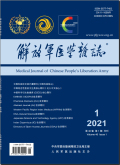解放军医学杂志2024,Vol.49Issue(2):152-158,7.DOI:10.11855/j.issn.0577-7402.2544.2023.0825
他汀类药物对急性缺血性卒中患者尿激酶静脉溶栓临床疗效的影响
Effects of different doses of statins on clinical outcomes in patients with acute ischemic stroke who received intravenous urokinase thrombolysis
摘要
Abstract
Objective To investigate the effect of different doses of statins on the clinical efficacy and safety outcome of intravenous thrombolytic therapy of urokinase in patients with acute ischemic stroke(AIS).Methods Based on a large prospective,multicenter study,the Chinese Intravenous Thrombolysis Registry for AIS within 4.5 h of onset(INTRECIS)database,clinical data of 898 patients with urokinase intravenous thrombolysis for AIS were retrospectively analyzed.According to the amount of statin used during hospitalization,the patients were divided into 132 patients in no-statin group,591 patients in conventional statin group and 175 patients in intensive statin group.Clinical outcome measures included 14-day improvement in the National Institutes of Health Stroke Scale(NIHSS)and 90-day excellent prognosis(improved Rankin score≤1 point).Safety measures included recurrent stroke,bleeding events,and 90-day all-cause mortality.Results After adjusting for differences in baseline characteristics(age,coronary heart disease,diabetes,atrial fibrillation,systolic blood pressure,OTT,DNT,previous anti-plate use,blood glucose,and treatment in Class A hospitals),NIHSS scores improved at 14 days after admission and excellent prognosis at 90 days after admission in convention-dose and intensive statin groups were superior to those in no-statin group(P<0.05);Univariate and multivariate analysis of safety outcome indicators showed no statistically significant differences in stroke recurrence and bleeding events among the three groups(P>0.05);The 90-day all-cause mortality was significantly higher in no-statin group(10.6%)than in convention-dose statin group(2.0%)and intensive dose statin group(2.9%)(P<0.01).Conclusions In patients with AIS who were treated with intravenous urokinase thrombolytic therapy,intensive statin use was associated with improved 14-day NIHSS score and near-term prognosis without increasing the risk of stroke recurrence and bleeding events.Statin use is beneficial to reduce mortality.关键词
他汀/急性缺血性卒中/尿激酶/静脉溶栓/预后Key words
statin/acute ischemic stroke/urokinase/intravenous thrombolysis/prognosis分类
医药卫生引用本文复制引用
王维姣,陈会生..他汀类药物对急性缺血性卒中患者尿激酶静脉溶栓临床疗效的影响[J].解放军医学杂志,2024,49(2):152-158,7.基金项目
This work was supported by the National Key Research and Development Program of China(2017YFC1308200) 国家重点研发计划(2017YFC1308200) (2017YFC1308200)

